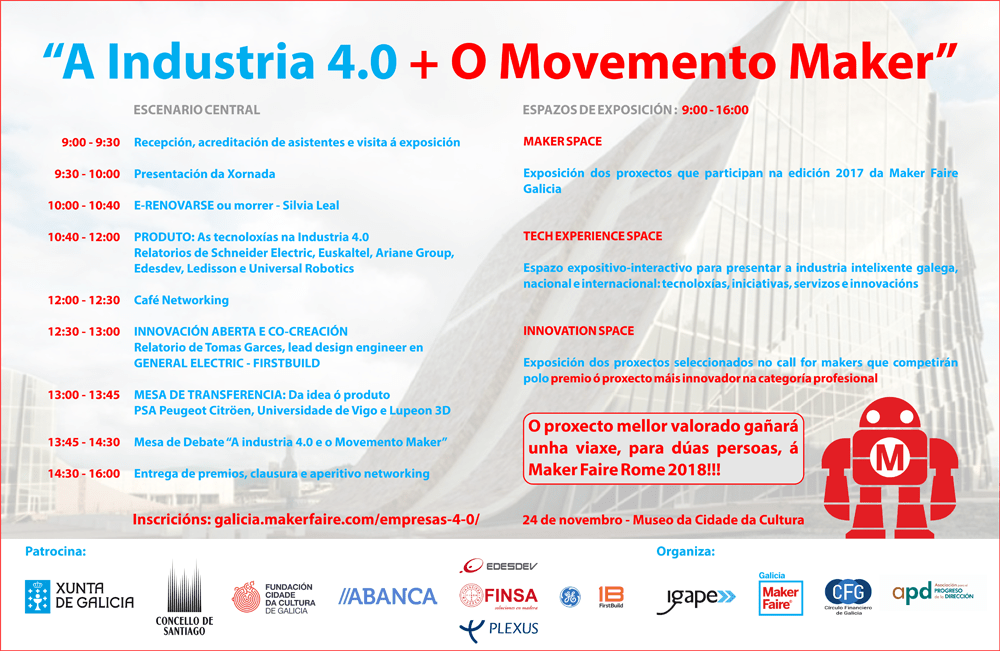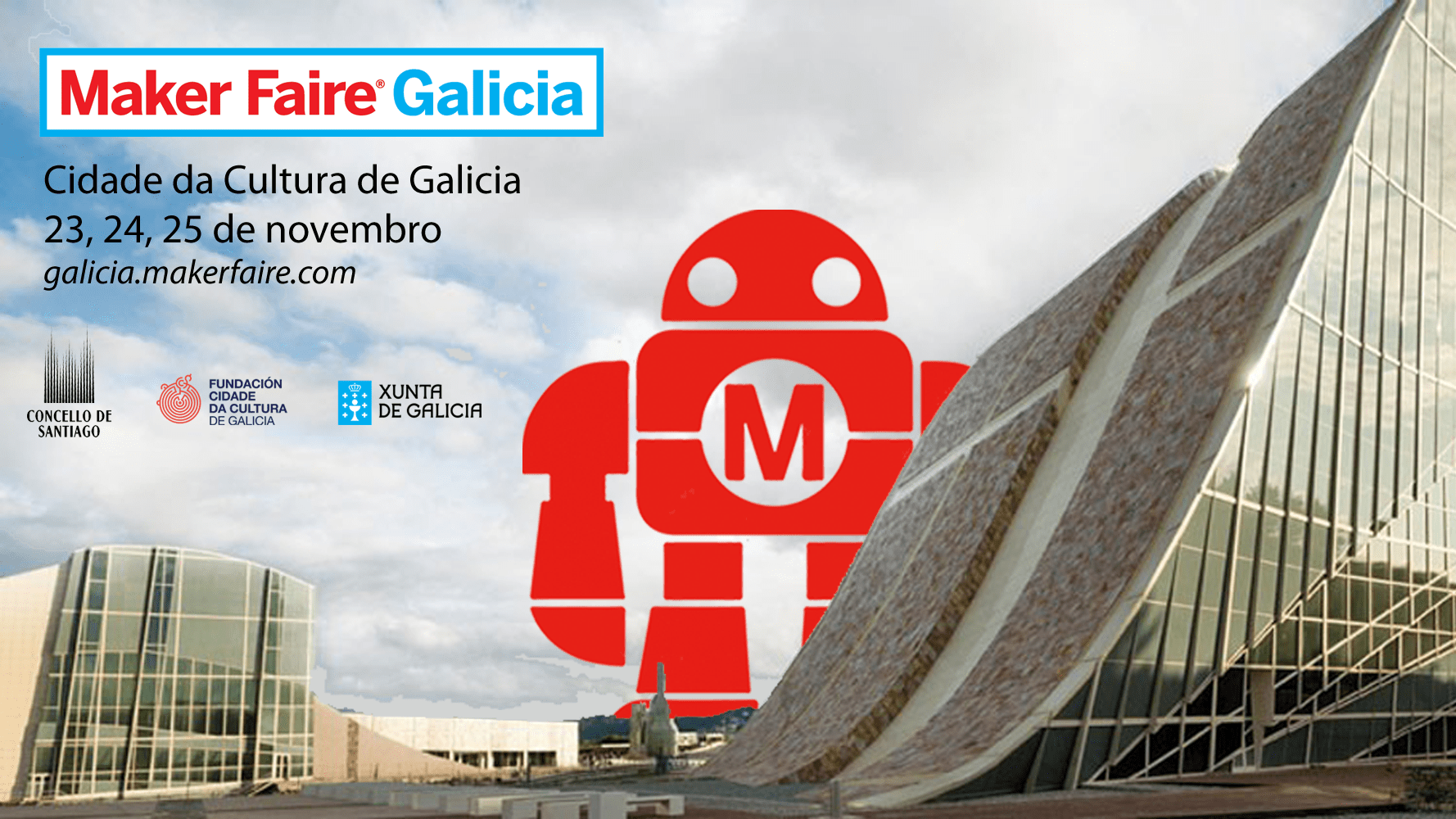NOS Open Space at Maker Faire Galicia 2018

NOS Open Space is an initiative of NOS DAY in collaboration with Maker Faire Galicia that aims to bring a different format to the Galician community of startups.
Conceived as an atypical conference where there are no speakers or agenda, in the NOS Open Space the attendees themselves will be in charge of the event, choosing the topics to be discussed and the sessions to be held by popular vote.
As they say in the NOS DAY website: “none of the talks will be given by a single person, interactive discussion is sought between people with different points of view and experience in different fields”. A completely free format that invites to the open participation of all those who want to contribute with their experiences, ideas and questions.
The NOS Open Space will take place on November 24, within the program of activities of the Maker Faire Galicia. In the following link you can know a little more about the proposal:
http://www.nosday.com/2018/10/08/nos-day-open-space/
Maker Faire Galicia, with the collaboration of the Spanish Foundation for Science and Technology – Ministry of Science, Innovation and Universities.
The bio-robotics of Julián Linares at Maker Faire Galicia 2018

Julián Caro Linares will give a talk at the Maker Faire Galicia in which he will explain in an entertaining way how to make bionispirated robots, the functioning of the nervous system of animals and how to imitate them using free FPGAs
Graduated in Electronics and Automation Engineering from the Carlos III University of Madrid. He is currently finishing a Master in Robotics that he combines with his work in R&D, prototyping and Robotics.
He has worked for many years in the field of educational robotics, training teachers and students from the community of Madrid in Arduino and 3D printing, and also as a teacher in STEM courses for teachers at the International University of La Rioja (UNIR). In addition, he is one of the authors of the textbooks Programming of the Things of Set Ventiuno, Santillana.
His master’s thesis, focused on the integration of open source FPGAs for bioinspired robots, has been published at the IEEE/RSJ International Conference on Intelligent Robots and Systems (IROS 2018). Passionate about the maker movement, free culture and the integration of robotics in society, he jokes that his dream is “to create a robot that wants to end humanity, be destroyed in the past, and return from the future reprogrammed to save it.”
With the collaboration of the Spanish Foundation for Science and Technology – Ministry of Science, Innovation and Universities.
David Aguilar, a story of self-improvement

David Aguilar will give a talk in the fourth edition of Maker Faire Galicia.
David Aguilar was born with a malformation in his arm. When he was just 9 years old, thanks to his ingenuity, he started to build an arm from basic pieces of Lego mixed with pieces of other robotic toys and tweezers.
A few years later, he finally got to build his first complete articulated arm using the pieces of a toy helicopter of his favorite brand. He did it in just 5 days! “When I move the arm the hand opens and closes, which allows me to pick up light objects and also push-ups”, he says. The arm was named MK1, which would later be followed by the MK2, made from a Lego airplane. The MK2 is a more advanced model that includes a battery that allows him to automate movements and load heavier objects. Since a few weeks ago, he has a new version of the arm, the MK3, made from a Lego crane of more than 4,000 pieces. A model much more evolved than the previous one.
David Aguilar has been designated ambassador of the Degree in Bioengineering of the International University of Catalonia (UIC) and has recently been awarded in Paris with the silver medal of the Universal League of Public Good for his services to humanity.
In his presentation at the Maker Faire Galicia people will see how the prosthesis works and how he uses them.
With the collaboration of the Spanish Foundation for Science and Technology – Ministry of Science, Innovation and Universities.
José Luís Cordeiro at Maker Faire Galicia 2018

José Luís Cordeiro, MIT engineer and coauthor of the book “The death of death” will give a talk in the fourth edition of Maker Faire Galicia.
Known worldwide for his transhumanist ideas, José Cordeiro, an engineer at the prestigious Massachusetts Institute of Technology, believes that advances in science and technology will not only stop aging, but rejuvenate people if they wish. “Death will be optional in 3 decades,” he says.
In 2016, he received the Health Excellence award for the promotion and dissemination of advances in longevity and life extension. He is a member of the World Academy of Art and Science; and, moreover, he was a founding professor of the Singularity University, an organization created by Google and NASA to study issues such as the evolution of artificial intelligence and disruptive technologies such as cryopreservation.
In all probability, one of the most controversial talks of this edition of the Maker Faire Galicia.
With the collaboration of the Spanish Foundation for Science and Technology – Ministry of Science, Innovation and Universities.
 
Gael Langevin at the Maker Faire Galicia 2018!

French designer Gael Langevin, known for being the creator of the first humanoid open source robot, will be at the Maker Faire Galicia 2018!
Gael Langevin is a French sculptor and designer. He works for the biggest brands since more than 25 years. InMoov is his personal project, it was initiated in January 2012 as the first Open Source prosthetic hand, it has lead to projects like Bionico, E-Nable, and many others.
InMoov is the first Open Source 3D printed life-size robot. Replicable on any home 3D printer with a 12x12x12cm area, it is conceived as a development platform for Universities, Laboratories, Hobbyist, but first of all for Makers.
It’s concept, based on sharing and community, gives him the honor to be reproduced for countless projects through out the world.
Gael Langevin has confirmed his attendance for the 4th edition of the Maker Faire Galicia, where we will have the unique opportunity to meet InMoov in person.
Photos and video of Gael Langevin / InMoov Raphaël Creton
With the collaboration of the Spanish Foundation for Science and Technology – Ministry of Science, Innovation and Universities.
 
Call for Makers is Open!

Yesterday was the official presentation of the fourth edition of the Maker Faire Galicia, which this year returns to the Gaiás Center Museum of the City of Culture of Galicia on 23, 24 and 25 November.
For this edition of 2018, we repeat the formula of last year with the Friday 23 dedicated to the professional sector of industry 4.0 and the Maker Movement. The weekend, Saturday 24 and Sunday 25, is kept to the general public, with a programme for all audiences: workshops, talks, performances or championships among many other scheduled activities that seek to surprise the visitor.
In this new edition we also bet on the internationality of the event, with speakers and reference exhibitors, among which we have already confirmed French designer Gael Langevin, from InMoov, creator of the first humanoid open source robot.
From today the application form is available for both the professional day and the general day.
For the Professional Day we will make a selection of the 10 finalist projects, giving priority to the ones that can be applied directly to the industry 4.0, offering solutions or complements to the sector. The makers will be able to show their projects and make contacts with potential investors or partners. In addition, a professional jury will choose the three most innovative. € 1000, € 500 and € 250 are the prizes that will be awarded for the first, second and third place respectively, plus an accrediting trophy.
For the General Days, makers can apply with projects of all disciplines (science, robotics, gastronomy, mechanics, electronics, urban art, music, crafts, education, etc.). Innovation, originality and interactivity with the visitors are the aspects that are most valued when choosing the final projects. During the event, in addition, the public will be able to vote for the best projects shown at the weekend. The winning categories are: Maker, Minimaker (projects made by girls and boys under 14), Senior Maker (third age makers) and educational projects (schools, institutes, associations, universities, vocational training, etc.)
Call for Makers ends on October 15. Sign up now!
With the collaboration of the Spanish Foundation for Science and Technology – Ministry of Science, Innovation and Universities.
Richard Stallman at Maker Faire Galicia (video)

If you want to see the lecture that Richard Stallman offered at the last Maker Faire Galicia, click on the image.
Official video of Maker Faire Galicia 2017

And here it is!!!! We can relive the Maker Faire Galicia 2017!!! Once again, we were able to enjoy the Maker Movement, scientific divulgation, crafts, urban culture and innovation in multiple areas. Thank you very much to all for sharing this event with us and many thanks to volunteers, makers, minimakers, partners and participants who made possible the Maker Faire Galicia 2017. See you again in November!
Industry 4.0 Day

This year we’ll have, for the first time, a day aimed exclusively to the professional sector, in which we will have international representatives in the field of innovation. The event will take place on the morning of November 24 at the Centro Gaiás Museum in the City of Culture of Galicia.
Debates on technology, innovation, intelligent productivity and the Maker Movement are part of a a program that includes, among others, the lecture by Tomás Garces, Lead Design Engineer in First Build, a worldwide reference project in innovation and that was carried out by General Electrics; or the one by Arian Group and Edesdev, to name just a few. In addition, there will be an exhibition space in which attendees can learn first-hand examples of the most innovative Galician makers. The act will conclude with an awards ceremony for the most innovative project exhibited during that day.
Companies interested in attending this day can register through a form enabled on our website.
We aim to be a meeting point between the makers and the most advanced industry, favoring the emergence of synergies that can lead to a fluid collaboration between these two complementary worlds. The companies will be able to know the most innovative technological projects carried out by makers and the makers will have a great opportunity to get potential partners.
Programme:

Richard Stallman at Maker Faire Galicia 2017

Well known as the “father of free software”, Richard Stallman will give a lecture within the programming of the Galicia Maker Faire.
Richard Stallman is one of the most significant figures of the worldwide free software movement. He’s known for creating in 1983 the GNU operating system, currently part of GNU / Linux, the first alternative to the main proprietary operating systems: Windows and MacOS. He has been recognized with numerous awards, including the Grace Hopper Award given by the Association for Computing Machinery by Emacs. With the creation of the GNU operating system, he laid the foundations of the free software movement, where everyone is free to copy, distribute and change the system. Currently the GNU / Linux system is used by tens of millions of computers. Through its foundation Free Software Foundation, Stallman seeks to raise awareness in society, and especially governments, to use free software both in institutions and public schools.
Richard Stallman’s lecture will be one of the highlights of this third edition of Maker Faire Galicia, which will also feature numerous entertainment activities aimed at all audiences and disciplines: innovation and creativity workshops, drone championships, robotics , interactive performances and much more.
You can watch and download Richard’s talk here.

